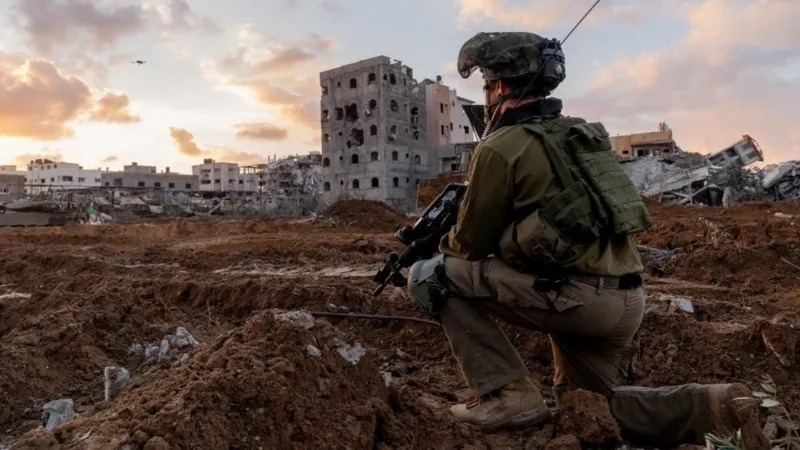Arms sales to Israel: UK should end arms sales to Israel, say legal experts
Three former Supreme Court justices have joined more than 600 legal experts in calling for the UK government to end weapons sales to Israel.

In a letter to the prime minister, they said exports must end because the UK risks breaking international law over a "plausible risk of genocide" in Gaza.
Rishi Sunak is already facing growing cross-party pressure after seven aid workers were killed in an air strike.
On Tuesday, he said the UK has a "very careful" arms licensing regime.
Who were the seven aid workers killed in Gaza?
What we know about the aid convoy strike
British sales are lower than those of other countries, including Germany and Italy, and dwarfed by the billions supplied by its largest arms supplier, the United States.
But a UK ban would add diplomatic and political pressure on Israel, at a time when its conduct in the Gaza conflict is coming under renewed international scrutiny.
Former Supreme Court president Lady Hale is among more than 600 lawyers, academics and retired senior judges who have signed a 17-page letter.
It says "serious action" is needed to "avoid UK complicity in grave breaches of international law, including potential violations of the Genocide Convention".
It adds that the sale of arms and weapons systems to Israel "falls significantly short" of the government's obligations under international law, given the "plausible risk of genocide" in Gaza - highlighted in a provisional judgement issued by the International Court of Justice (ICJ) in January - and the worsening humanitarian situation since.
Other signatories include former Supreme Court justices Lord Sumption and Lord Wilson, along with nine other judges and 69 senior barristers.
Speaking on BBC Radio 4's Today programme, Lord Sumption emphasised the importance the provisional ruling from the UN's highest court should have on UK policy, even though the ICJ's final ruling has not yet been issued.
"It seems to me that if you have a duty, as we do, to prevent genocide - and there is a plausible case that is what is happening - you should do what you can to obstruct it," he said.
The former Supreme Court judge added that the "framework of international law around war" does not mean countries can act however they want, even if they have been provoked or attacked, "however outrageously".
He said: "It doesn't mean to say that you can indiscriminately slaughter innocent civilians and children. It doesn't mean to say you can attack aid convoys, you can withdraw the visas of aid workers. It doesn't mean to say you can spend two weeks flattening hospitals."
"There are limits to what people can do, even in self-defence."
Among other actions the letter says the government must take to meet its obligations under international law are:
restoring funding to the UN's agency for Palestinian refugees, UNRWA, after it was suspended over allegations employees were involved in the 7 October attacks on Israel
imposing sanctions on "individuals and entities who have made statements inciting genocide against Palestinians"
suspending ongoing diplomatic and "enhanced trade deal" negotiations with Israel
launching a review into suspending the UK's existing trade deal and "consider the imposition of sanctions" on Israel
The growing calls for the suspension of UK export licences comes after seven aid workers - including three British citizens - were killed in an Israeli air strike in Gaza on Monday.
Australian, Palestinian, American-Canadian, and Polish nationals were also killed. The group had just unloaded more than 100 tonnes of food aid.
Speaking to the Sun newspaper after the incident, Mr Sunak called for an independent investigation, but stopped short of saying arms sales should end.
He added that the UK had been "consistently clear" with Israel that it must follow international humanitarian law.
Israeli Prime Minister Benjamin Netanyahu has described the attack as unintended and "tragic", and promised an independent investigation. It rejects the claim of genocide as "wholly unfounded".
The UK has licenced arms to Israel worth over £574m since 2008, when official country-level data was made available, according to pressure group Campaign Against Arms Trade (CAAT).
Business Minister Greg Hands has previously told MPs the figure for 2022 - £42m - represented 0.02% of Israel's military imports that year.
Arms export licences, which are granted by the business department, cannot be issued if there is a clear risk the weapons could be used in a serious violation of international humanitarian law.
The Labour Party has not called for a suspension, but is urging the government to publish internal legal advice on whether Israel is in breach of international law.
Shadow foreign secretary David Lammy said there was "precedent" for suspending sales. Former PMs Margaret Thatcher and Tony Blair both took the move, in 1982 and 2002 respectively.
The SNP is calling for Parliament to be recalled from its current Easter break, ending on 15 April, to debate the issue.
Conservative MP Paul Bristow said the idea British-made arms could be used in action that kills innocent civilians in Gaza "turns the stomach," adding that the deaths of British aid workers "must be a line in the sand".
But his fellow Tory MP and former home secretary Suella Braverman rejected the idea of a ban, telling the BBC "we owe it to Israel to stand with them".
Speaking during a trip to Israel, she said: "I think that it would be a tragic shame if we were to walk away from our closest ally in this region".
Much of the Gaza Strip has been devastated during the Israeli military operations that began after Hamas gunmen attacked southern Israel on 7 October, killing about 1,200 people and seizing 253 hostages.
About 130 of the hostages remain in captivity, at least 34 of whom are presumed dead.
More than 32,916 people have been killed in Gaza since then, the Hamas-run health ministry says.
-bbc







